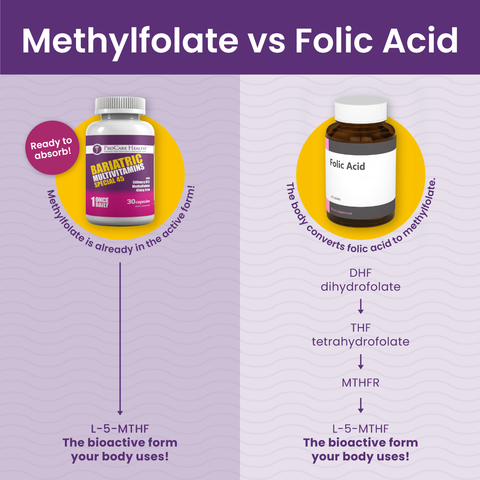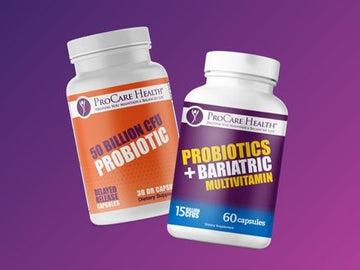by Anthony Benjamin on Oct 12, 2022

The Facts of Folate
By: Katie Chapmon, MS, RD, a Los Angeles-based registered dietitian
After metabolic and bariatric surgery (MBS), vitamins are one of your “must haves” to prevent deficiencies. Folate deficiency is common after bariatric surgery and plays a key role in a variety of functions within your body. When it comes to folate, you may hear some other terms swirling about – folic acid and methylfolate. So, what’s the difference? And why is methylfolate a better choice for you?
What Is Folate?
Folate is a B vitamin (Vitamin B9, to be exact) that is naturally occurring in foods. Folate is used in several processes of the body. It is most well-known for its participation in the creation of DNA and other genetic materials, but it is also needed for proper cell division and eventual creation of new cells.
Folate is naturally present in many foods including:
- Liver
- Asparagus
- Brussels sprouts
- Dark green leafy vegetables (such as spinach or mustard greens)
- Nuts and beans (such as peanuts, black eyed peas, and kidney beans)
The amount of folate needed varies depending upon age, but most adults need 400 mcg dietary folate equivalents (DFE) per day. This amount increases during pregnancy and breastfeeding (but more on that later). Folate deficiency can cause anemia with symptoms of weakness, fatigue, trouble concentrating, irritability, headache, and shortness of breath. On the other hand, adequate folate has also been studied to decrease the risk of several forms of cancer and cardiovascular disease, as well as play a role in depression. A blood test can evaluate your levels to make sure you’re in a normal range.
What’s the Difference Between Folate, Folic Acid and Methylfolate?
While folate is naturally occurring in foods, a form of folate called folic acid is used in food fortification and dietary supplements. You may hear folate and folic acid used interchangeably, but they are not the same. While most micronutrients are more readily absorbed through a food source, folic acid is better absorbed in comparison to folate.
Folic acid was the primary source used and listed in dietary supplements. As folate metabolism was further investigated, methylfolate was a better choice in supplementation for its absorption and direct availability in the body. To understand methylfolate a little better, we have to take a look at how folate is absorbed in the body overall.
Folate from food is broken down into folic acid in the gut before it is absorbed through the intestinal wall. This same process occurs when a supplement of folic acid is taken (minus the food breakdown). Before entering the bloodstream, an enzyme converts folic acid to methylfolate. Methylfolate is the main form of folate in our blood plasma.
Unlike folic acid, methylfolate does not have to be converted in the body when consumed and can be used immediately for various processes.
Methylfolate and Metabolic and Bariatric Surgery
Folate deficiency is reported in up to 65% of patients after a weight-loss surgery. This may be due to a decreased intake of folate-rich foods, not taking vitamins consistently, taking inadequate vitamin supplementation, and other less prominent reasons. Per the American Society of Metabolic and Bariatric Surgery, patients should take 400-800 mcg DFE from their multivitamin. If pregnant after bariatric surgery, you should increase this amount to 800-1,000 mcg DFE per day.
Surgery can change how vitamins are absorbed by altering the digestive tract or changing the speed in which a vitamin is moved through the digestive tract. Due to these adjustments, there may be concern for absorption or metabolism of certain vitamins and minerals. Methylfolate sidesteps these concerns, as it is already in the form used directly by the body without the need of the metabolism process.
Folate and Pregnancy
Folate is really important for pregnancy. This B vitamin supports neural tube development during pregnancy, preventing serious birth defects of the brain and spinal cord. Dietary folate cannot likely meet a woman’s elevated folate needs during pregnancy. To help prevent neural tube defects, it is recommended for women to start a folic acid supplement at least 1 month before pregnancy begins.
Current Centers for Disease Control (CDC) guidelines specify that all women of reproductive age should supplement with 400 mcg DFE of folic acid per day. Methylfolate has not been studied in pregnant women directly, but it does improve folate markers in women of childbearing age. With improved folate markers from methylfolate, it is also used to reduce incidence of neural tube defects. Of course with all forms of vitamins – long-term, large-scale research with this population would be needed for evaluation and direct conclusions.
What Is the MTHFR Gene Mutation?
Methylenetetrahydrofolate reductase (MTHFR) is an enzyme critical to the conversion of folate into its active form. Mutations or variants in the MTHFR gene decrease the ability to metabolize folate or folic acid. You can have either one or two mutations (or neither) on the MTHFR gene. Some people may see some health symptoms with a MTHFR gene variant, but that varies from person to person. These symptoms may also be related to other health conditions, so it’s best to follow up with your doctor to rule anything else out.
Keep in mind that research around MTHFR and its effects is still evolving. Most organizations do not recommend testing for mutations unless a person has certain health indications. Having a MTHFR mutation doesn’t mean you need medical treatment. It could just mean you need to take a vitamin B supplement with methylfolate.
Why Is Methylfolate the Best Form of Folate for My Supplement?
Methylfolate is the body’s most fully active form of folate and does not require the conversion process from folic or folic acid. There are several variables that can affect folate metabolism – gene mutations, inadequate partners in the folate metabolism pathway, or factors affecting folate transport. Methylfolate takes out the guesswork by using the most effective form of folate and eliminating the need to convert this vitamin in the body. Folate is such an essential nutrient for any stage of life. Most multivitamins, along with your food intake, will be adequate to meet your folate needs. Supplementation will be needed during pregnancy or in the pre-pregnancy stages. And, when looking at the supplement label, be sure to review the form of folate used.

How the Low FODMAP Diet Is Good for Gut Health

What Is Food Noise?




